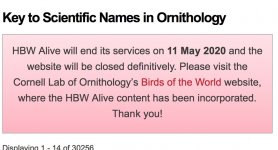l_raty
laurent raty
This is a very common situation.The first user Brisson did not use it as a genus?
http://www.zoonomen.net/cit/RI/Genera/C/c01985a.jpg .
The next user cited it Cyanecula Briss. before the ruling only Brisson's genus names were OK.
http://www.zoonomen.net/cit/RI/Genera/C/c01986a.jpg .
The first author who used the name as generic (or subgeneric), in a published work applying the principles of binominal nomenclature and in a way that fulfilled the current requirements for availability, made this name available. Brisson did not; but Brehm did (at least in 1831; the status of the names in his 1828-30 lists of German birds published in Isis is disputed, not because any name would be attributed to Brisson there, but because Brehm did not describe the birds or cite an authority for the included species-group names, which can thus all be deemed unidentifiable, potentially making all the new generic names introduced there, Cyanecula included, nomina nuda); by so doing he became the author of the name. It is irrelevant that he attributed the name to an earlier author who had failed to do it before him.
(I'm not sure this belongs in the present thread, though
Last edited:









